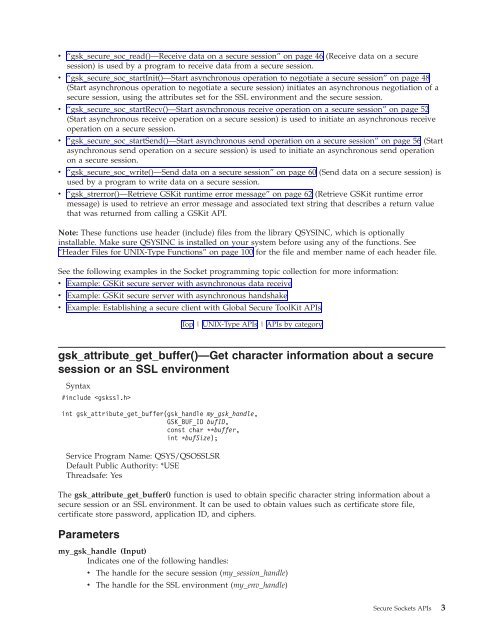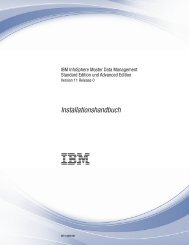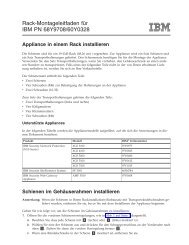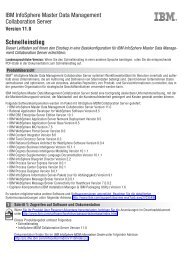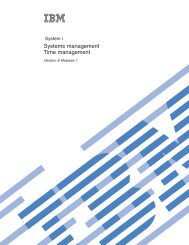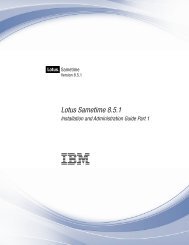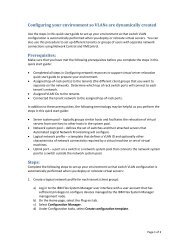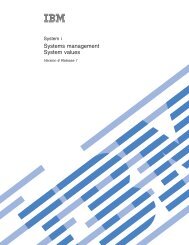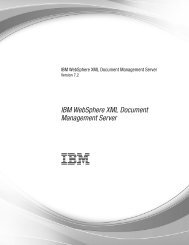System i: Programming Secure Sockets APIs - IBM
System i: Programming Secure Sockets APIs - IBM
System i: Programming Secure Sockets APIs - IBM
You also want an ePaper? Increase the reach of your titles
YUMPU automatically turns print PDFs into web optimized ePapers that Google loves.
v “gsk_secure_soc_read()—Receive data on a secure session” on page 46 (Receive data on a secure<br />
session) is used by a program to receive data from a secure session.<br />
v “gsk_secure_soc_startInit()—Start asynchronous operation to negotiate a secure session” on page 48<br />
(Start asynchronous operation to negotiate a secure session) initiates an asynchronous negotiation of a<br />
secure session, using the attributes set for the SSL environment and the secure session.<br />
v “gsk_secure_soc_startRecv()—Start asynchronous receive operation on a secure session” on page 52<br />
(Start asynchronous receive operation on a secure session) is used to initiate an asynchronous receive<br />
operation on a secure session.<br />
v “gsk_secure_soc_startSend()—Start asynchronous send operation on a secure session” on page 56 (Start<br />
asynchronous send operation on a secure session) is used to initiate an asynchronous send operation<br />
on a secure session.<br />
v “gsk_secure_soc_write()—Send data on a secure session” on page 60 (Send data on a secure session) is<br />
used by a program to write data on a secure session.<br />
v “gsk_strerror()—Retrieve GSKit runtime error message” on page 62 (Retrieve GSKit runtime error<br />
message) is used to retrieve an error message and associated text string that describes a return value<br />
that was returned from calling a GSKit API.<br />
Note: These functions use header (include) files from the library QSYSINC, which is optionally<br />
installable. Make sure QSYSINC is installed on your system before using any of the functions. See<br />
“Header Files for UNIX-Type Functions” on page 100 for the file and member name of each header file.<br />
See the following examples in the Socket programming topic collection for more information:<br />
v Example: GSKit secure server with asynchronous data receive<br />
v Example: GSKit secure server with asynchronous handshake<br />
v Example: Establishing a secure client with Global <strong>Secure</strong> ToolKit <strong>APIs</strong><br />
Top | UNIX-Type <strong>APIs</strong> | <strong>APIs</strong> by category<br />
gsk_attribute_get_buffer()—Get character information about a secure<br />
session or an SSL environment<br />
Syntax<br />
#include <br />
int gsk_attribute_get_buffer(gsk_handle my_gsk_handle,<br />
GSK_BUF_ID bufID,<br />
const char **buffer,<br />
int *bufSize);<br />
Service Program Name: QSYS/QSOSSLSR<br />
Default Public Authority: *USE<br />
Threadsafe: Yes<br />
The gsk_attribute_get_buffer() function is used to obtain specific character string information about a<br />
secure session or an SSL environment. It can be used to obtain values such as certificate store file,<br />
certificate store password, application ID, and ciphers.<br />
Parameters<br />
my_gsk_handle (Input)<br />
Indicates one of the following handles:<br />
v The handle for the secure session (my_session_handle)<br />
v The handle for the SSL environment (my_env_handle)<br />
<strong>Secure</strong> <strong>Sockets</strong> <strong>APIs</strong> 3


